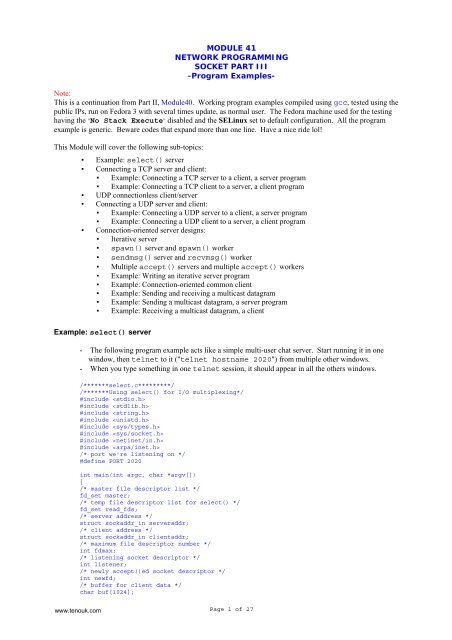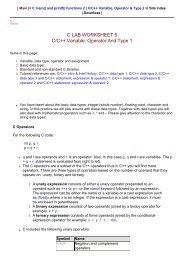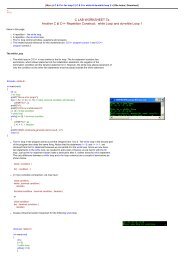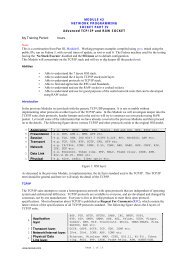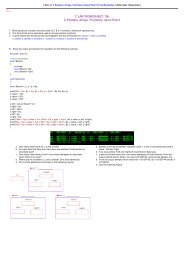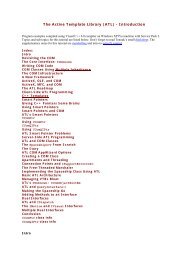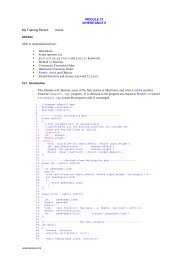GNU C socket programming more on TCP/IP UDP ... - Tenouk C & C++
GNU C socket programming more on TCP/IP UDP ... - Tenouk C & C++
GNU C socket programming more on TCP/IP UDP ... - Tenouk C & C++
You also want an ePaper? Increase the reach of your titles
YUMPU automatically turns print PDFs into web optimized ePapers that Google loves.
MODULE 41<br />
NETWORK PROGRAMMING<br />
SOCKET PART III<br />
-Program Examples-<br />
Note:<br />
This is a c<strong>on</strong>tinuati<strong>on</strong> from Part II, Module40. Working program examples compiled using gcc, tested using the<br />
public <strong>IP</strong>s, run <strong>on</strong> Fedora 3 with several times update, as normal user. The Fedora machine used for the testing<br />
having the "No Stack Execute" disabled and the SELinux set to default c<strong>on</strong>figurati<strong>on</strong>. All the program<br />
example is generic. Beware codes that expand <str<strong>on</strong>g>more</str<strong>on</strong>g> than <strong>on</strong>e line. Have a nice ride lol!<br />
This Module will cover the following sub-topics:<br />
▪<br />
▪<br />
▪<br />
▪<br />
▪<br />
Example: select() server<br />
C<strong>on</strong>necting a <strong>TCP</strong> server and client:<br />
▪ Example: C<strong>on</strong>necting a <strong>TCP</strong> server to a client, a server program<br />
▪ Example: C<strong>on</strong>necting a <strong>TCP</strong> client to a server, a client program<br />
<strong>UDP</strong> c<strong>on</strong>necti<strong>on</strong>less client/server<br />
C<strong>on</strong>necting a <strong>UDP</strong> server and client:<br />
▪ Example: C<strong>on</strong>necting a <strong>UDP</strong> server to a client, a server program<br />
▪ Example: C<strong>on</strong>necting a <strong>UDP</strong> client to a server, a client program<br />
C<strong>on</strong>necti<strong>on</strong>-oriented server designs:<br />
▪ Iterative server<br />
▪ spawn() server and spawn() worker<br />
▪ sendmsg() server and recvmsg() worker<br />
▪ Multiple accept() servers and multiple accept() workers<br />
▪ Example: Writing an iterative server program<br />
▪ Example: C<strong>on</strong>necti<strong>on</strong>-oriented comm<strong>on</strong> client<br />
▪ Example: Sending and receiving a multicast datagram<br />
▪ Example: Sending a multicast datagram, a server program<br />
▪ Example: Receiving a multicast datagram, a client<br />
Example: select() server<br />
- The following program example acts like a simple multi-user chat server. Start running it in <strong>on</strong>e<br />
window, then telnet to it ("telnet hostname 2020") from multiple other windows.<br />
- When you type something in <strong>on</strong>e telnet sessi<strong>on</strong>, it should appear in all the others windows.<br />
/*******select.c*********/<br />
/*******Using select() for I/O multiplexing*/<br />
#include <br />
#include <br />
#include <br />
#include <br />
#include <br />
#include <br />
#include <br />
#include <br />
/* port we're listening <strong>on</strong> */<br />
#define PORT 2020<br />
int main(int argc, char *argv[])<br />
{<br />
/* master file descriptor list */<br />
fd_set master;<br />
/* temp file descriptor list for select() */<br />
fd_set read_fds;<br />
/* server address */<br />
struct sockaddr_in serveraddr;<br />
/* client address */<br />
struct sockaddr_in clientaddr;<br />
/* maximum file descriptor number */<br />
int fdmax;<br />
/* listening <str<strong>on</strong>g>socket</str<strong>on</strong>g> descriptor */<br />
int listener;<br />
/* newly accept()ed <str<strong>on</strong>g>socket</str<strong>on</strong>g> descriptor */<br />
int newfd;<br />
/* buffer for client data */<br />
char buf[1024];<br />
www.tenouk.com<br />
Page 1 of 27
int nbytes;<br />
/* for setsockopt() SO_REUSEADDR, below */<br />
int yes = 1;<br />
int addrlen;<br />
int i, j;<br />
/* clear the master and temp sets */<br />
FD_ZERO(&master);<br />
FD_ZERO(&read_fds);<br />
/* get the listener */<br />
if((listener = <str<strong>on</strong>g>socket</str<strong>on</strong>g>(AF_INET, SOCK_STREAM, 0)) == -1)<br />
{<br />
perror("Server-<str<strong>on</strong>g>socket</str<strong>on</strong>g>() error lol!");<br />
/*just exit lol!*/<br />
exit(1);<br />
}<br />
printf("Server-<str<strong>on</strong>g>socket</str<strong>on</strong>g>() is OK...\n");<br />
/*"address already in use" error message */<br />
if(setsockopt(listener, SOL_SOCKET, SO_REUSEADDR, &yes, sizeof(int)) == -1)<br />
{<br />
perror("Server-setsockopt() error lol!");<br />
exit(1);<br />
}<br />
printf("Server-setsockopt() is OK...\n");<br />
/* bind */<br />
serveraddr.sin_family = AF_INET;<br />
serveraddr.sin_addr.s_addr = INADDR_ANY;<br />
serveraddr.sin_port = ht<strong>on</strong>s(PORT);<br />
memset(&(serveraddr.sin_zero), '\0', 8);<br />
if(bind(listener, (struct sockaddr *)&serveraddr, sizeof(serveraddr)) == -1)<br />
{<br />
perror("Server-bind() error lol!");<br />
exit(1);<br />
}<br />
printf("Server-bind() is OK...\n");<br />
/* listen */<br />
if(listen(listener, 10) == -1)<br />
{<br />
perror("Server-listen() error lol!");<br />
exit(1);<br />
}<br />
printf("Server-listen() is OK...\n");<br />
/* add the listener to the master set */<br />
FD_SET(listener, &master);<br />
/* keep track of the biggest file descriptor */<br />
fdmax = listener; /* so far, it's this <strong>on</strong>e*/<br />
/* loop */<br />
for(;;)<br />
{<br />
/* copy it */<br />
read_fds = master;<br />
if(select(fdmax+1, &read_fds, NULL, NULL, NULL) == -1)<br />
{<br />
perror("Server-select() error lol!");<br />
exit(1);<br />
}<br />
printf("Server-select() is OK...\n");<br />
/*run through the existing c<strong>on</strong>necti<strong>on</strong>s looking for data to be read*/<br />
for(i = 0; i
FD_SET(newfd, &master); /* add to master set */<br />
if(newfd > fdmax)<br />
{ /* keep track of the maximum */<br />
fdmax = newfd;<br />
}<br />
printf("%s: New c<strong>on</strong>necti<strong>on</strong> from %s <strong>on</strong> <str<strong>on</strong>g>socket</str<strong>on</strong>g> %d\n", argv[0],<br />
inet_ntoa(clientaddr.sin_addr), newfd);<br />
}<br />
}<br />
else<br />
{<br />
/* handle data from a client */<br />
if((nbytes = recv(i, buf, sizeof(buf), 0))
- Do some verificati<strong>on</strong>.<br />
[bodo@bakawali test<str<strong>on</strong>g>socket</str<strong>on</strong>g>]$ ps aux | grep select<br />
bodo 27474 0.0 0.2 1384 292 pts/2 S+ 14:32 0:00 ./select<br />
bodo 27507 0.0 0.5 3724 668 pts/3 S+ 14:34 0:00 grep select<br />
[bodo@bakawali test<str<strong>on</strong>g>socket</str<strong>on</strong>g>]$ netstat -a |grep 2020<br />
tcp 0 0 *:2020 *:* LISTEN<br />
[bodo@bakawali test<str<strong>on</strong>g>socket</str<strong>on</strong>g>]$<br />
- Telnet from other computers or windows using hostname or the <strong>IP</strong> address. Here we use hostname,<br />
bakawali. Use escape character ( Ctrl + ] ) to terminate command. For other telnet command please<br />
type help.<br />
[bodo@bakawali test<str<strong>on</strong>g>socket</str<strong>on</strong>g>]$ telnet bakawali 2020<br />
Trying 203.106.93.94...<br />
C<strong>on</strong>nected to bakawali.jmti.gov.my (203.106.93.94).<br />
Escape character is '^]'.<br />
^]<br />
telnet> mode line<br />
testing some text<br />
the most visible <strong>on</strong>e<br />
- The last two messages were typed at another two machines that c<strong>on</strong>nected through <str<strong>on</strong>g>socket</str<strong>on</strong>g> 5 and 6<br />
(<str<strong>on</strong>g>socket</str<strong>on</strong>g> 4 is another window of the server) using telnet. Socket 5 and 6 are from Windows 2000 Server<br />
machines.<br />
- The following are messages <strong>on</strong> the server c<strong>on</strong>sole. There are another two machine c<strong>on</strong>nected to the<br />
server and the messages at the server c<strong>on</strong>sole is shown below.<br />
[bodo@bakawali test<str<strong>on</strong>g>socket</str<strong>on</strong>g>]$ Server-select() is OK...<br />
Server-accept() is OK...<br />
./select: New c<strong>on</strong>necti<strong>on</strong> from 203.106.93.94 <strong>on</strong> <str<strong>on</strong>g>socket</str<strong>on</strong>g> 4<br />
Server-select() is OK...<br />
...<br />
Server-accept() is OK...<br />
./select: New c<strong>on</strong>necti<strong>on</strong> from 203.106.93.91 <strong>on</strong> <str<strong>on</strong>g>socket</str<strong>on</strong>g> 5<br />
Server-select() is OK...<br />
Server-select() is OK...<br />
...<br />
Server-select() is OK...<br />
Server-select() is OK...<br />
Server-accept() is OK...<br />
./select: New c<strong>on</strong>necti<strong>on</strong> from 203.106.93.82 <strong>on</strong> <str<strong>on</strong>g>socket</str<strong>on</strong>g> 6<br />
- When the clients disc<strong>on</strong>nected from the server through <str<strong>on</strong>g>socket</str<strong>on</strong>g> 4, 5 and 6, the following messages appear<br />
<strong>on</strong> the server c<strong>on</strong>sole.<br />
...<br />
Server-select() is OK...<br />
Server-select() is OK...<br />
./select: <str<strong>on</strong>g>socket</str<strong>on</strong>g> 5 hung up<br />
Server-select() is OK...<br />
./select: <str<strong>on</strong>g>socket</str<strong>on</strong>g> 6 hung up<br />
Server-select() is OK...<br />
./select: <str<strong>on</strong>g>socket</str<strong>on</strong>g> 4 hung up<br />
- There are two file descriptor sets in the code: master and read_fds. The first, master, holds all<br />
the <str<strong>on</strong>g>socket</str<strong>on</strong>g> descriptors that are currently c<strong>on</strong>nected, as well as the <str<strong>on</strong>g>socket</str<strong>on</strong>g> descriptor that is listening for<br />
new c<strong>on</strong>necti<strong>on</strong>s.<br />
- The reas<strong>on</strong> we have the master set is that select() actually changes the set you pass into it to<br />
reflect which <str<strong>on</strong>g>socket</str<strong>on</strong>g>s are ready to read. Since we have to keep track of the c<strong>on</strong>necti<strong>on</strong>s from <strong>on</strong>e call of<br />
select() to the next, we must store these safely away somewhere. At the last minute, we copy the<br />
master into the read_fds, and then call select().<br />
- Then every time we get a new c<strong>on</strong>necti<strong>on</strong>, we have to add it to the master set and also every time a<br />
c<strong>on</strong>necti<strong>on</strong> closes, we have to remove it from the master set.<br />
- Notice that we check to see when the listener <str<strong>on</strong>g>socket</str<strong>on</strong>g> is ready to read. When it is, it means we have<br />
a new c<strong>on</strong>necti<strong>on</strong> pending, and we accept() it and add it to the master set. Similarly, when a client<br />
www.tenouk.com<br />
Page 4 of 27
c<strong>on</strong>necti<strong>on</strong> is ready to read, and recv() returns 0, we know that the client has closed the c<strong>on</strong>necti<strong>on</strong>,<br />
and we must remove it from the master set.<br />
- If the client recv() returns n<strong>on</strong>-zero, though, we know some data has been received. So we get it, and<br />
then go through the master list and send that data to all the rest of the c<strong>on</strong>nected clients.<br />
C<strong>on</strong>necting a <strong>TCP</strong> server and client<br />
- The following program examples are c<strong>on</strong>necti<strong>on</strong>-oriented where <str<strong>on</strong>g>socket</str<strong>on</strong>g>s use <strong>TCP</strong> to c<strong>on</strong>nect a server to<br />
a client, and a client to a server. This example provides <str<strong>on</strong>g>more</str<strong>on</strong>g> complete <str<strong>on</strong>g>socket</str<strong>on</strong>g>s’ APIs usage.<br />
Example: C<strong>on</strong>necting a <strong>TCP</strong> server to a client, a server program<br />
/************tcpserver.c************************/<br />
/* Header files needed to use the <str<strong>on</strong>g>socket</str<strong>on</strong>g>s API. */<br />
/* File c<strong>on</strong>tain Macro, Data Type and Structure */<br />
/***********************************************/<br />
#include <br />
#include <br />
#include <br />
#include <br />
#include <br />
#include <br />
#include <br />
#include <br />
#include <br />
/* BufferLength is 100 bytes */<br />
#define BufferLength 100<br />
/* Server port number */<br />
#define SERVPORT 3111<br />
int main()<br />
{<br />
/* Variable and structure definiti<strong>on</strong>s. */<br />
int sd, sd2, rc, length = sizeof(int);<br />
int totalcnt = 0, <strong>on</strong> = 1;<br />
char temp;<br />
char buffer[BufferLength];<br />
struct sockaddr_in serveraddr;<br />
struct sockaddr_in their_addr;<br />
fd_set read_fd;<br />
struct timeval timeout;<br />
timeout.tv_sec = 15;<br />
timeout.tv_usec = 0;<br />
/* The <str<strong>on</strong>g>socket</str<strong>on</strong>g>() functi<strong>on</strong> returns a <str<strong>on</strong>g>socket</str<strong>on</strong>g> descriptor */<br />
/* representing an endpoint. The statement also */<br />
/* identifies that the INET (Internet Protocol) */<br />
/* address family with the <strong>TCP</strong> transport (SOCK_STREAM) */<br />
/* will be used for this <str<strong>on</strong>g>socket</str<strong>on</strong>g>. */<br />
/************************************************/<br />
/* Get a <str<strong>on</strong>g>socket</str<strong>on</strong>g> descriptor */<br />
if((sd = <str<strong>on</strong>g>socket</str<strong>on</strong>g>(AF_INET, SOCK_STREAM, 0)) < 0)<br />
{<br />
perror("Server-<str<strong>on</strong>g>socket</str<strong>on</strong>g>() error");<br />
/* Just exit */<br />
exit (-1);<br />
}<br />
else<br />
printf("Server-<str<strong>on</strong>g>socket</str<strong>on</strong>g>() is OK\n");<br />
/* The setsockopt() functi<strong>on</strong> is used to allow */<br />
/* the local address to be reused when the server */<br />
/* is restarted before the required wait time */<br />
/* expires. */<br />
/***********************************************/<br />
/* Allow <str<strong>on</strong>g>socket</str<strong>on</strong>g> descriptor to be reusable */<br />
if((rc = setsockopt(sd, SOL_SOCKET, SO_REUSEADDR, (char *)&<strong>on</strong>, sizeof(<strong>on</strong>))) < 0)<br />
{<br />
perror("Server-setsockopt() error");<br />
close(sd);<br />
exit (-1);<br />
}<br />
else<br />
printf("Server-setsockopt() is OK\n");<br />
/* bind to an address */<br />
www.tenouk.com<br />
Page 5 of 27
memset(&serveraddr, 0x00, sizeof(struct sockaddr_in));<br />
serveraddr.sin_family = AF_INET;<br />
serveraddr.sin_port = ht<strong>on</strong>s(SERVPORT);<br />
serveraddr.sin_addr.s_addr = ht<strong>on</strong>l(INADDR_ANY);<br />
printf("Using %s, listening at %d\n", inet_ntoa(serveraddr.sin_addr), SERVPORT);<br />
/* After the <str<strong>on</strong>g>socket</str<strong>on</strong>g> descriptor is created, a bind() */<br />
/* functi<strong>on</strong> gets a unique name for the <str<strong>on</strong>g>socket</str<strong>on</strong>g>. */<br />
/* In this example, the user sets the */<br />
/* s_addr to zero, which allows the system to */<br />
/* c<strong>on</strong>nect to any client that used port 3005. */<br />
if((rc = bind(sd, (struct sockaddr *)&serveraddr, sizeof(serveraddr))) < 0)<br />
{<br />
perror("Server-bind() error");<br />
/* Close the <str<strong>on</strong>g>socket</str<strong>on</strong>g> descriptor */<br />
close(sd);<br />
/* and just exit */<br />
exit(-1);<br />
}<br />
else<br />
printf("Server-bind() is OK\n");<br />
/* The listen() functi<strong>on</strong> allows the server to accept */<br />
/* incoming client c<strong>on</strong>necti<strong>on</strong>s. In this example, */<br />
/* the backlog is set to 10. This means that the */<br />
/* system can queue up to 10 c<strong>on</strong>necti<strong>on</strong> requests before */<br />
/* the system starts rejecting incoming requests.*/<br />
/*************************************************/<br />
/* Up to 10 clients can be queued */<br />
if((rc = listen(sd, 10)) < 0)<br />
{<br />
perror("Server-listen() error");<br />
close(sd);<br />
exit (-1);<br />
}<br />
else<br />
printf("Server-Ready for client c<strong>on</strong>necti<strong>on</strong>...\n");<br />
/* The server will accept a c<strong>on</strong>necti<strong>on</strong> request */<br />
/* with this accept() functi<strong>on</strong>, provided the */<br />
/* c<strong>on</strong>necti<strong>on</strong> request does the following: */<br />
/* - Is part of the same address family */<br />
/* - Uses streams <str<strong>on</strong>g>socket</str<strong>on</strong>g>s (<strong>TCP</strong>) */<br />
/* - Attempts to c<strong>on</strong>nect to the specified port */<br />
/***********************************************/<br />
/* accept() the incoming c<strong>on</strong>necti<strong>on</strong> request. */<br />
int sin_size = sizeof(struct sockaddr_in);<br />
if((sd2 = accept(sd, (struct sockaddr *)&their_addr, &sin_size)) < 0)<br />
{<br />
perror("Server-accept() error");<br />
close(sd);<br />
exit (-1);<br />
}<br />
else<br />
printf("Server-accept() is OK\n");<br />
/*client <strong>IP</strong>*/<br />
printf("Server-new <str<strong>on</strong>g>socket</str<strong>on</strong>g>, sd2 is OK...\n");<br />
printf("Got c<strong>on</strong>necti<strong>on</strong> from the f***ing client: %s\n", inet_ntoa(their_addr.sin_addr));<br />
/* The select() functi<strong>on</strong> allows the process to */<br />
/* wait for an event to occur and to wake up */<br />
/* the process when the event occurs. In this */<br />
/* example, the system notifies the process */<br />
/* <strong>on</strong>ly when data is available to read. */<br />
/***********************************************/<br />
/* Wait for up to 15 sec<strong>on</strong>ds <strong>on</strong> */<br />
/* select() for data to be read. */<br />
FD_ZERO(&read_fd);<br />
FD_SET(sd2, &read_fd);<br />
rc = select(sd2+1, &read_fd, NULL, NULL, &timeout);<br />
if((rc == 1) && (FD_ISSET(sd2, &read_fd)))<br />
{<br />
/* Read data from the client. */<br />
totalcnt = 0;<br />
while(totalcnt < BufferLength)<br />
{<br />
www.tenouk.com<br />
Page 6 of 27
* When select() indicates that there is data */<br />
/* available, use the read() functi<strong>on</strong> to read */<br />
/* 100 bytes of the string that the */<br />
/* client sent. */<br />
/***********************************************/<br />
/* read() from client */<br />
rc = read(sd2, &buffer[totalcnt], (BufferLength - totalcnt));<br />
if(rc < 0)<br />
{<br />
perror("Server-read() error");<br />
close(sd);<br />
close(sd2);<br />
exit (-1);<br />
}<br />
else if (rc == 0)<br />
{<br />
printf("Client program has issued a close()\n");<br />
close(sd);<br />
close(sd2);<br />
exit(-1);<br />
}<br />
else<br />
{<br />
totalcnt += rc;<br />
printf("Server-read() is OK\n");<br />
}<br />
}<br />
}<br />
else if (rc < 0)<br />
{<br />
perror("Server-select() error");<br />
close(sd);<br />
close(sd2);<br />
exit(-1);<br />
}<br />
/* rc == 0 */<br />
else<br />
{<br />
printf("Server-select() timed out.\n");<br />
close(sd);<br />
close(sd2);<br />
exit(-1);<br />
}<br />
/*Shows the data*/<br />
printf("Received data from the f***ing client: %s\n", buffer);<br />
/* Echo some bytes of string, back */<br />
/* to the client by using the write() */<br />
/* functi<strong>on</strong>. */<br />
/************************************/<br />
/* write() some bytes of string, */<br />
/* back to the client. */<br />
printf("Server-Echoing back to client...\n");<br />
rc = write(sd2, buffer, totalcnt);<br />
if(rc != totalcnt)<br />
{<br />
perror("Server-write() error");<br />
/* Get the error number. */<br />
rc = getsockopt(sd2, SOL_SOCKET, SO_ERROR, &temp, &length);<br />
if(rc == 0)<br />
{<br />
/* Print out the asynchr<strong>on</strong>ously */<br />
/* received error. */<br />
errno = temp;<br />
perror("SO_ERROR was: ");<br />
}<br />
else<br />
printf("Server-write() is OK\n");<br />
close(sd);<br />
close(sd2);<br />
exit(-1);<br />
}<br />
/* When the data has been sent, close() */<br />
/* the <str<strong>on</strong>g>socket</str<strong>on</strong>g> descriptor that was returned */<br />
/* from the accept() verb and close() the */<br />
/* original <str<strong>on</strong>g>socket</str<strong>on</strong>g> descriptor. */<br />
www.tenouk.com<br />
Page 7 of 27
*****************************************/<br />
/* Close the c<strong>on</strong>necti<strong>on</strong> to the client and */<br />
/* close the server listening <str<strong>on</strong>g>socket</str<strong>on</strong>g>. */<br />
/******************************************/<br />
close(sd2) ;<br />
close(sd);<br />
exit(0);<br />
return 0;<br />
}<br />
- Compile and link the program. Make sure there is no error.<br />
[bodo@bakawali test<str<strong>on</strong>g>socket</str<strong>on</strong>g>]$ gcc -g tcpserver.c -o tcpserver<br />
- Run the program. In this example we let the program run in the background.<br />
[bodo@bakawali test<str<strong>on</strong>g>socket</str<strong>on</strong>g>]$ ./tcpserver<br />
Server-<str<strong>on</strong>g>socket</str<strong>on</strong>g>() is OK<br />
Server-setsockopt() is OK<br />
Using 0.0.0.0, listening at 3111<br />
Server-bind() is OK<br />
Server-Ready for client c<strong>on</strong>necti<strong>on</strong>...<br />
[1]+ Stopped ./tcpserver<br />
[bodo@bakawali test<str<strong>on</strong>g>socket</str<strong>on</strong>g>]$ bg<br />
[1]+ ./tcpserver &<br />
[bodo@bakawali test<str<strong>on</strong>g>socket</str<strong>on</strong>g>]$<br />
- Do some verificati<strong>on</strong>.<br />
[bodo@bakawali test<str<strong>on</strong>g>socket</str<strong>on</strong>g>]$ ps aux | grep tcpserver<br />
bodo 7914 0.0 0.2 3172 324 pts/3 S 11:59 0:00 ./tcpserver<br />
bodo 7921 0.0 0.5 5540 648 pts/3 S+ 12:01 0:00 grep tcpserver<br />
[bodo@bakawali test<str<strong>on</strong>g>socket</str<strong>on</strong>g>]$ netstat -a | grep 3111<br />
tcp 0 0 *:3111 *:* LISTEN<br />
- When the next program example (the <strong>TCP</strong> client) is run, the following messages should be expected at<br />
the server c<strong>on</strong>sole.<br />
[bodo@bakawali test<str<strong>on</strong>g>socket</str<strong>on</strong>g>]$ Server-accept() is OK<br />
Server-new <str<strong>on</strong>g>socket</str<strong>on</strong>g>, sd2 is OK...<br />
Got c<strong>on</strong>necti<strong>on</strong> from the f***ing client: 203.106.93.94<br />
Server-read() is OK<br />
Received data from the f***ing client: This is a test string from client lol!!!<br />
Server-Echoing back to client...<br />
[1]+ D<strong>on</strong>e ./tcpserver<br />
[bodo@bakawali test<str<strong>on</strong>g>socket</str<strong>on</strong>g>]$<br />
- If the server program and then the client are run, the following messages should be expected at the<br />
server c<strong>on</strong>sole.<br />
[bodo@bakawali test<str<strong>on</strong>g>socket</str<strong>on</strong>g>]$ ./tcpserver<br />
Server-<str<strong>on</strong>g>socket</str<strong>on</strong>g>() is OK<br />
Server-setsockopt() is OK<br />
Using 0.0.0.0, listening at 3111<br />
Server-bind() is OK<br />
Server-Ready for client c<strong>on</strong>necti<strong>on</strong>...<br />
Server-accept() is OK<br />
Server-new <str<strong>on</strong>g>socket</str<strong>on</strong>g>, sd2 is OK...<br />
Got c<strong>on</strong>necti<strong>on</strong> from the f***ing client: 203.106.93.94<br />
Server-read() is OK<br />
Received data from the f***ing client: This is a test string from client lol!!!<br />
Server-Echoing back to client...<br />
[bodo@bakawali test<str<strong>on</strong>g>socket</str<strong>on</strong>g>]$<br />
- Just telneting the server.<br />
[bodo@bakawali test<str<strong>on</strong>g>socket</str<strong>on</strong>g>]$ telnet 203.106.93.94 3111<br />
www.tenouk.com<br />
Page 8 of 27
Trying 203.106.93.94...<br />
C<strong>on</strong>nected to bakawali.jmti.gov.my (203.106.93.94).<br />
Escape character is '^]'.<br />
^]<br />
telnet> help<br />
Commands may be abbreviated. Commands are:<br />
close<br />
close current c<strong>on</strong>necti<strong>on</strong><br />
logout<br />
forcibly logout remote user and close the c<strong>on</strong>necti<strong>on</strong><br />
display<br />
display operating parameters<br />
mode<br />
try to enter line or character mode ('mode ?' for <str<strong>on</strong>g>more</str<strong>on</strong>g>)<br />
open<br />
c<strong>on</strong>nect to a site<br />
quit<br />
exit telnet<br />
send<br />
transmit special characters ('send ?' for <str<strong>on</strong>g>more</str<strong>on</strong>g>)<br />
set<br />
set operating parameters ('set ?' for <str<strong>on</strong>g>more</str<strong>on</strong>g>)<br />
unset<br />
unset operating parameters ('unset ?' for <str<strong>on</strong>g>more</str<strong>on</strong>g>)<br />
status<br />
print status informati<strong>on</strong><br />
toggle<br />
toggle operating parameters ('toggle ?' for <str<strong>on</strong>g>more</str<strong>on</strong>g>)<br />
slc<br />
change state of special characters ('slc ?' for <str<strong>on</strong>g>more</str<strong>on</strong>g>)<br />
auth<br />
turn <strong>on</strong> (off) authenticati<strong>on</strong> ('auth ?' for <str<strong>on</strong>g>more</str<strong>on</strong>g>)<br />
encrypt<br />
turn <strong>on</strong> (off) encrypti<strong>on</strong> ('encrypt ?' for <str<strong>on</strong>g>more</str<strong>on</strong>g>)<br />
forward<br />
turn <strong>on</strong> (off) credential forwarding ('forward ?' for <str<strong>on</strong>g>more</str<strong>on</strong>g>)<br />
z<br />
suspend telnet<br />
! invoke a subshell<br />
envir<strong>on</strong><br />
change envir<strong>on</strong>ment variables ('envir<strong>on</strong> ?' for <str<strong>on</strong>g>more</str<strong>on</strong>g>)<br />
? print help informati<strong>on</strong><br />
telnet>quit<br />
- Well, it looks that we have had a telnet sessi<strong>on</strong> with the server.<br />
Example: C<strong>on</strong>necting a <strong>TCP</strong> client to a server, a client program<br />
- Well, let try the client program that will c<strong>on</strong>nect to the previous server program.<br />
- The following example shows how to c<strong>on</strong>nect a <str<strong>on</strong>g>socket</str<strong>on</strong>g> client program to a c<strong>on</strong>necti<strong>on</strong>-oriented server.<br />
/************tcpclient.c************************/<br />
/* Header files needed to use the <str<strong>on</strong>g>socket</str<strong>on</strong>g>s API. */<br />
/* File c<strong>on</strong>tains Macro, Data Type and */<br />
/* Structure definiti<strong>on</strong>s al<strong>on</strong>g with Functi<strong>on</strong> */<br />
/* prototypes. */<br />
#include <br />
#include <br />
#include <br />
#include <br />
#include <br />
#include <br />
#include <br />
#include <br />
#include <br />
#include <br />
/* BufferLength is 100 bytes */<br />
#define BufferLength 100<br />
/* Default host name of server system. Change it to your default */<br />
/* server hostname or <strong>IP</strong>. If the user do not supply the hostname */<br />
/* as an argument, the_server_name_or_<strong>IP</strong> will be used as default*/<br />
#define SERVER "The_server_name_or_<strong>IP</strong>"<br />
/* Server's port number */<br />
#define SERVPORT 3111<br />
/* Pass in 1 parameter which is either the */<br />
/* address or host name of the server, or */<br />
/* set the server name in the #define SERVER ... */<br />
int main(int argc, char *argv[])<br />
{<br />
/* Variable and structure definiti<strong>on</strong>s. */<br />
int sd, rc, length = sizeof(int);<br />
struct sockaddr_in serveraddr;<br />
char buffer[BufferLength];<br />
char server[255];<br />
char temp;<br />
int totalcnt = 0;<br />
struct hostent *hostp;<br />
char data[100] = "This is a test string from client lol!!! ";<br />
www.tenouk.com<br />
Page 9 of 27
* The <str<strong>on</strong>g>socket</str<strong>on</strong>g>() functi<strong>on</strong> returns a <str<strong>on</strong>g>socket</str<strong>on</strong>g> */<br />
/* descriptor representing an endpoint. */<br />
/* The statement also identifies that the */<br />
/* INET (Internet Protocol) address family */<br />
/* with the <strong>TCP</strong> transport (SOCK_STREAM) */<br />
/* will be used for this <str<strong>on</strong>g>socket</str<strong>on</strong>g>. */<br />
/******************************************/<br />
/* get a <str<strong>on</strong>g>socket</str<strong>on</strong>g> descriptor */<br />
if((sd = <str<strong>on</strong>g>socket</str<strong>on</strong>g>(AF_INET, SOCK_STREAM, 0)) < 0)<br />
{<br />
perror("Client-<str<strong>on</strong>g>socket</str<strong>on</strong>g>() error");<br />
exit(-1);<br />
}<br />
else<br />
printf("Client-<str<strong>on</strong>g>socket</str<strong>on</strong>g>() OK\n");<br />
/*If the server hostname is supplied*/<br />
if(argc > 1)<br />
{<br />
/*Use the supplied argument*/<br />
strcpy(server, argv[1]);<br />
printf("C<strong>on</strong>necting to the f***ing %s, port %d ...\n", server, SERVPORT);<br />
}<br />
else<br />
/*Use the default server name or <strong>IP</strong>*/<br />
strcpy(server, SERVER);<br />
memset(&serveraddr, 0x00, sizeof(struct sockaddr_in));<br />
serveraddr.sin_family = AF_INET;<br />
serveraddr.sin_port = ht<strong>on</strong>s(SERVPORT);<br />
if((serveraddr.sin_addr.s_addr = inet_addr(server)) == (unsigned l<strong>on</strong>g)INADDR_NONE)<br />
{<br />
/* When passing the host name of the server as a */<br />
/* parameter to this program, use the gethostbyname() */<br />
/* functi<strong>on</strong> to retrieve the address of the host server. */<br />
/***************************************************/<br />
/* get host address */<br />
hostp = gethostbyname(server);<br />
if(hostp == (struct hostent *)NULL)<br />
{<br />
printf("HOST NOT FOUND --> ");<br />
/* h_errno is usually defined */<br />
/* in netdb.h */<br />
printf("h_errno = %d\n",h_errno);<br />
printf("---This is a client program---\n");<br />
printf("Command usage: %s \n", argv[0]);<br />
close(sd) ;<br />
exit(-1);<br />
}<br />
memcpy(&serveraddr.sin_addr, hostp->h_addr, sizeof(serveraddr.sin_addr));<br />
}<br />
/* After the <str<strong>on</strong>g>socket</str<strong>on</strong>g> descriptor is received, the */<br />
/* c<strong>on</strong>nect() functi<strong>on</strong> is used to establish a */<br />
/* c<strong>on</strong>necti<strong>on</strong> to the server. */<br />
/***********************************************/<br />
/* c<strong>on</strong>nect() to server. */<br />
if((rc = c<strong>on</strong>nect(sd, (struct sockaddr *)&serveraddr, sizeof(serveraddr))) < 0)<br />
{<br />
perror("Client-c<strong>on</strong>nect() error");<br />
close(sd) ;<br />
exit(-1);<br />
}<br />
else<br />
printf("C<strong>on</strong>necti<strong>on</strong> established...\n");<br />
/* Send string to the server using */<br />
/* the write() functi<strong>on</strong>. */<br />
/*********************************************/<br />
/* Write() some string to the server. */<br />
printf("Sending some string to the f***ing %s...\n", server);<br />
rc = write(sd, data, sizeof(data));<br />
if(rc < 0)<br />
{<br />
perror("Client-write() error");<br />
rc = getsockopt(sd, SOL_SOCKET, SO_ERROR, &temp, &length);<br />
if(rc == 0)<br />
{<br />
www.tenouk.com<br />
Page 10 of 27
* Print out the asynchr<strong>on</strong>ously received error. */<br />
errno = temp;<br />
perror("SO_ERROR was");<br />
}<br />
close(sd) ;<br />
exit(-1);<br />
}<br />
else<br />
{<br />
printf("Client-write() is OK\n");<br />
printf("String successfully sent lol!\n");<br />
printf("Waiting the %s to echo back...\n", server);<br />
}<br />
totalcnt = 0;<br />
while(totalcnt < BufferLength)<br />
{<br />
/* Wait for the server to echo the */<br />
/* string by using the read() functi<strong>on</strong>. */<br />
/***************************************/<br />
/* Read data from the server. */<br />
rc = read(sd, &buffer[totalcnt], BufferLength-totalcnt);<br />
if(rc < 0)<br />
{<br />
perror("Client-read() error");<br />
close(sd);<br />
exit(-1);<br />
}<br />
else if (rc == 0)<br />
{<br />
printf("Server program has issued a close()\n");<br />
close(sd) ;<br />
exit(-1);<br />
}<br />
else<br />
totalcnt += rc;<br />
}<br />
printf("Client-read() is OK\n");<br />
printf("Echoed data from the f***ing server: %s\n", buffer);<br />
/* When the data has been read, close() */<br />
/* the <str<strong>on</strong>g>socket</str<strong>on</strong>g> descriptor. */<br />
/****************************************/<br />
/* Close <str<strong>on</strong>g>socket</str<strong>on</strong>g> descriptor from client side. */<br />
close(sd);<br />
exit(0);<br />
return 0;<br />
}<br />
- Compile and link the client program.<br />
[bodo@bakawali test<str<strong>on</strong>g>socket</str<strong>on</strong>g>]$ gcc -g tcpclient.c -o tcpclient<br />
- Run the program. Before that d<strong>on</strong>’t forget to run the server program first. The first run is without the<br />
server hostname/<strong>IP</strong>.<br />
[bodo@bakawali test<str<strong>on</strong>g>socket</str<strong>on</strong>g>]$ ./tcpclient<br />
Client-<str<strong>on</strong>g>socket</str<strong>on</strong>g>() OK<br />
HOST NOT FOUND --> h_errno = 1<br />
---This is a client program---<br />
Command usage: ./tcpclient <br />
[bodo@bakawali test<str<strong>on</strong>g>socket</str<strong>on</strong>g>]$<br />
- Then run with the server hostname or <strong>IP</strong>.<br />
[bodo@bakawali test<str<strong>on</strong>g>socket</str<strong>on</strong>g>]$ ./tcpclient 203.106.93.94<br />
Client-<str<strong>on</strong>g>socket</str<strong>on</strong>g>() OK<br />
C<strong>on</strong>necting to the f***ing 203.106.93.94, port 3111 ...<br />
C<strong>on</strong>necti<strong>on</strong> established...<br />
Sending some string to the f***ing 203.106.93.94...<br />
Client-write() is OK<br />
String successfully sent lol!<br />
Waiting the 203.106.93.94 to echo back...<br />
Client-read() is OK<br />
www.tenouk.com<br />
Page 11 of 27
Echoed data from the f***ing server: This is a test string from client lol!!!<br />
[bodo@bakawali test<str<strong>on</strong>g>socket</str<strong>on</strong>g>]$<br />
- And at the server c<strong>on</strong>sole.<br />
[bodo@bakawali test<str<strong>on</strong>g>socket</str<strong>on</strong>g>]$ ./tcpserver<br />
Server-<str<strong>on</strong>g>socket</str<strong>on</strong>g>() is OK<br />
Server-setsockopt() is OK<br />
Using 0.0.0.0, listening at 3111<br />
Server-bind() is OK<br />
Server-Ready for client c<strong>on</strong>necti<strong>on</strong>...<br />
Server-accept() is OK<br />
Server-new <str<strong>on</strong>g>socket</str<strong>on</strong>g>, sd2 is OK...<br />
Got c<strong>on</strong>necti<strong>on</strong> from the f***ing client: 203.106.93.94<br />
Server-read() is OK<br />
Received data from the f***ing client: This is a test string from client lol!!!<br />
Server-Echoing back to client...<br />
[bodo@bakawali test<str<strong>on</strong>g>socket</str<strong>on</strong>g>]$<br />
- Well, it works!<br />
<strong>UDP</strong> c<strong>on</strong>necti<strong>on</strong>less client/server<br />
- The c<strong>on</strong>necti<strong>on</strong>less protocol server and client examples illustrate the <str<strong>on</strong>g>socket</str<strong>on</strong>g> APIs that are written for<br />
User Datagram Protocol (<strong>UDP</strong>). The server and client examples use the following sequence of functi<strong>on</strong><br />
calls:<br />
▪<br />
▪<br />
<str<strong>on</strong>g>socket</str<strong>on</strong>g>()<br />
bind()<br />
- The following figure illustrates the client/server relati<strong>on</strong>ship of the <str<strong>on</strong>g>socket</str<strong>on</strong>g> APIs for a c<strong>on</strong>necti<strong>on</strong>less<br />
protocol.<br />
Figure 1: <strong>UDP</strong> c<strong>on</strong>necti<strong>on</strong>less APIs relati<strong>on</strong>ship.<br />
www.tenouk.com<br />
Page 12 of 27
C<strong>on</strong>necting a <strong>UDP</strong> server and client<br />
- The following examples show how to use <strong>UDP</strong> to c<strong>on</strong>nect a server to a c<strong>on</strong>necti<strong>on</strong>less client, and a<br />
c<strong>on</strong>necti<strong>on</strong>less client to a server.<br />
Example: C<strong>on</strong>necting a <strong>UDP</strong> server to a client, a server program<br />
- The first example shows how to use <strong>UDP</strong> to c<strong>on</strong>nect a c<strong>on</strong>necti<strong>on</strong>less <str<strong>on</strong>g>socket</str<strong>on</strong>g> server program to a client.<br />
/*******************udpserver.c*****************/<br />
/* Header files needed to use the <str<strong>on</strong>g>socket</str<strong>on</strong>g>s API. */<br />
/* File c<strong>on</strong>tain Macro, Data Type and Structure */<br />
/* definiti<strong>on</strong>s al<strong>on</strong>g with Functi<strong>on</strong> prototypes. */<br />
/* header files */<br />
#include <br />
#include <br />
#include <br />
#include <br />
#include <br />
#include <br />
#include <br />
/* Server's port number, listen at 3333 */<br />
#define SERVPORT 3333<br />
/* Run the server without argument */<br />
int main(int argc, char *argv[])<br />
{<br />
/* Variable and structure definiti<strong>on</strong>s. */<br />
int sd, rc;<br />
struct sockaddr_in serveraddr, clientaddr;<br />
int clientaddrlen = sizeof(clientaddr);<br />
int serveraddrlen = sizeof(serveraddr);<br />
char buffer[100];<br />
char *bufptr = buffer;<br />
int buflen = sizeof(buffer);<br />
/* The <str<strong>on</strong>g>socket</str<strong>on</strong>g>() functi<strong>on</strong> returns a <str<strong>on</strong>g>socket</str<strong>on</strong>g> */<br />
/* descriptor representing an endpoint. */<br />
/* The statement also identifies that the */<br />
/* INET (Internet Protocol) address family */<br />
/* with the <strong>UDP</strong> transport (SOCK_DGRAM) will */<br />
/* be used for this <str<strong>on</strong>g>socket</str<strong>on</strong>g>. */<br />
/******************************************/<br />
/* get a <str<strong>on</strong>g>socket</str<strong>on</strong>g> descriptor */<br />
if((sd = <str<strong>on</strong>g>socket</str<strong>on</strong>g>(AF_INET, SOCK_DGRAM, 0)) < 0)<br />
{<br />
perror("<strong>UDP</strong> server - <str<strong>on</strong>g>socket</str<strong>on</strong>g>() error");<br />
exit(-1);<br />
}<br />
else<br />
printf("<strong>UDP</strong> server - <str<strong>on</strong>g>socket</str<strong>on</strong>g>() is OK\n");<br />
printf("<strong>UDP</strong> server - try to bind...\n");<br />
/* After the <str<strong>on</strong>g>socket</str<strong>on</strong>g> descriptor is received, */<br />
/* a bind() is d<strong>on</strong>e to assign a unique name */<br />
/* to the <str<strong>on</strong>g>socket</str<strong>on</strong>g>. In this example, the user */<br />
/* set the s_addr to zero. This allows the */<br />
/* system to c<strong>on</strong>nect to any client that uses */<br />
/* port 3333. */<br />
/********************************************/<br />
/* bind to address */<br />
memset(&serveraddr, 0x00, serveraddrlen);<br />
serveraddr.sin_family = AF_INET;<br />
serveraddr.sin_port = ht<strong>on</strong>s(SERVPORT);<br />
serveraddr.sin_addr.s_addr = ht<strong>on</strong>l(INADDR_ANY);<br />
if((rc = bind(sd, (struct sockaddr *)&serveraddr, serveraddrlen)) < 0)<br />
{<br />
perror("<strong>UDP</strong> server - bind() error");<br />
close(sd);<br />
/* If something wr<strong>on</strong>g with <str<strong>on</strong>g>socket</str<strong>on</strong>g>(), just exit lol */<br />
exit(-1);<br />
}<br />
else<br />
printf("<strong>UDP</strong> server - bind() is OK\n");<br />
www.tenouk.com<br />
Page 13 of 27
printf("Using <strong>IP</strong> %s and port %d\n", inet_ntoa(serveraddr.sin_addr), SERVPORT);<br />
printf("<strong>UDP</strong> server - Listening...\n");<br />
/* Use the recvfrom() functi<strong>on</strong> to receive the */<br />
/* data. The recvfrom() functi<strong>on</strong> waits */<br />
/* indefinitely for data to arrive. */<br />
/************************************************/<br />
/* This example does not use flags that c<strong>on</strong>trol */<br />
/* the recepti<strong>on</strong> of the data. */<br />
/************************************************/<br />
/* Wait <strong>on</strong> client requests. */<br />
rc = recvfrom(sd, bufptr, buflen, 0, (struct sockaddr *)&clientaddr, &clientaddrlen);<br />
if(rc < 0)<br />
{<br />
perror("<strong>UDP</strong> Server - recvfrom() error");<br />
close(sd) ;<br />
exit(-1);<br />
}<br />
else<br />
printf("<strong>UDP</strong> Server - recvfrom() is OK...\n");<br />
printf("<strong>UDP</strong> Server received the following:\n \"%s\" message\n", bufptr);<br />
printf("from port %d and address %s.\n", ntohs(clientaddr.sin_port),<br />
inet_ntoa(clientaddr.sin_addr));<br />
/* Send a reply by using the sendto() functi<strong>on</strong>. */<br />
/* In this example, the system echoes the received */<br />
/* data back to the client. */<br />
/************************************************/<br />
/* This example does not use flags that c<strong>on</strong>trol */<br />
/* the transmissi<strong>on</strong> of the data */<br />
/************************************************/<br />
/* Send a reply, just echo the request */<br />
printf("<strong>UDP</strong> Server replying to the stupid <strong>UDP</strong> client...\n");<br />
rc = sendto(sd, bufptr, buflen, 0, (struct sockaddr *)&clientaddr, clientaddrlen);<br />
if(rc < 0)<br />
{<br />
perror("<strong>UDP</strong> server - sendto() error");<br />
close(sd) ;<br />
exit(-1);<br />
}<br />
else<br />
printf("<strong>UDP</strong> Server - sendto() is OK...\n");<br />
/* When the data has been sent, close() the */<br />
/* <str<strong>on</strong>g>socket</str<strong>on</strong>g> descriptor. */<br />
/********************************************/<br />
/* close() the <str<strong>on</strong>g>socket</str<strong>on</strong>g> descriptor. */<br />
close(sd);<br />
exit(0);<br />
}<br />
- Compile and link the udp server program.<br />
[bodo@bakawali test<str<strong>on</strong>g>socket</str<strong>on</strong>g>]$ gcc -g udpserver.c -o udpserver<br />
- Run the program and let it run in the background.<br />
[bodo@bakawali test<str<strong>on</strong>g>socket</str<strong>on</strong>g>]$ ./udpserver<br />
<strong>UDP</strong> server - <str<strong>on</strong>g>socket</str<strong>on</strong>g>() is OK<br />
<strong>UDP</strong> server - try to bind...<br />
<strong>UDP</strong> server - bind() is OK<br />
Using <strong>IP</strong> 0.0.0.0 and port 3333<br />
<strong>UDP</strong> server - Listening...<br />
[1]+ Stopped ./udpserver<br />
[bodo@bakawali test<str<strong>on</strong>g>socket</str<strong>on</strong>g>]$ bg<br />
[1]+ ./udpserver &<br />
[bodo@bakawali test<str<strong>on</strong>g>socket</str<strong>on</strong>g>]$<br />
- Verify the program running.<br />
[bodo@bakawali test<str<strong>on</strong>g>socket</str<strong>on</strong>g>]$ ps aux | grep udpserver<br />
bodo 7963 0.0 0.2 2240 324 pts/2 S 12:22 0:00 ./udpserver<br />
bodo 7965 0.0 0.5 4324 648 pts/2 S+ 12:24 0:00 grep udpserver<br />
www.tenouk.com<br />
Page 14 of 27
- Verify that the udp server is listening at port 3333 waiting for the client c<strong>on</strong>necti<strong>on</strong>.<br />
[bodo@bakawali test<str<strong>on</strong>g>socket</str<strong>on</strong>g>]$ netstat -a | grep 3333<br />
udp 0 0 *:3333 *:*<br />
[bodo@bakawali test<str<strong>on</strong>g>socket</str<strong>on</strong>g>]$<br />
- Without the client program (next example) you can try telneting the server using port 3333 for testing.<br />
For this program example the following telnet sessi<strong>on</strong> cannot be established for <strong>UDP</strong>/c<strong>on</strong>necti<strong>on</strong>less.<br />
[bodo@bakawali test<str<strong>on</strong>g>socket</str<strong>on</strong>g>]$ telnet 203.106.93.94 3333<br />
Trying 203.106.93.94...<br />
telnet: c<strong>on</strong>nect to address 203.106.93.94: C<strong>on</strong>necti<strong>on</strong> refused<br />
telnet: Unable to c<strong>on</strong>nect to remote host: C<strong>on</strong>necti<strong>on</strong> refused<br />
Example: C<strong>on</strong>necting a <strong>UDP</strong> client to a server, a client program<br />
- The following example shows how to use <strong>UDP</strong> to c<strong>on</strong>nect a c<strong>on</strong>necti<strong>on</strong>less <str<strong>on</strong>g>socket</str<strong>on</strong>g> client program to a<br />
server. This program will be used to c<strong>on</strong>nect to the previous <strong>UDP</strong> server.<br />
/****************udpclient.c********************/<br />
/* Header files needed to use the <str<strong>on</strong>g>socket</str<strong>on</strong>g>s API. */<br />
/* File c<strong>on</strong>tain Macro, Data Type and Structure */<br />
/* definiti<strong>on</strong>s al<strong>on</strong>g with Functi<strong>on</strong> prototypes. */<br />
/***********************************************/<br />
#include <br />
#include <br />
#include <br />
#include <br />
#include <br />
#include <br />
#include <br />
#include <br />
/* Host name of my system, change accordingly */<br />
/* Put the server hostname that run the <strong>UDP</strong> server program */<br />
/* This will be used as default <strong>UDP</strong> server for client c<strong>on</strong>necti<strong>on</strong> */<br />
#define SERVER "bakawali"<br />
/* Server's port number */<br />
#define SERVPORT 3333<br />
/* Pass in 1 argument (argv[1]) which is either the */<br />
/* address or host name of the server, or */<br />
/* set the server name in the #define SERVER above. */<br />
int main(int argc, char *argv[])<br />
{<br />
/* Variable and structure definiti<strong>on</strong>s. */<br />
int sd, rc;<br />
struct sockaddr_in serveraddr, clientaddr;<br />
int serveraddrlen = sizeof(serveraddr);<br />
char server[255];<br />
char buffer[100];<br />
char *bufptr = buffer;<br />
int buflen = sizeof(buffer);<br />
struct hostent *hostp;<br />
memset(buffer, 0x00, sizeof(buffer));<br />
/* 36 characters + terminating NULL */<br />
memcpy(buffer, "Hello! A client request message lol!", 37);<br />
/* The <str<strong>on</strong>g>socket</str<strong>on</strong>g>() functi<strong>on</strong> returns a <str<strong>on</strong>g>socket</str<strong>on</strong>g> */<br />
/* descriptor representing an endpoint. */<br />
/* The statement also identifies that the */<br />
/* INET (Internet Protocol) address family */<br />
/* with the <strong>UDP</strong> transport (SOCK_DGRAM) will */<br />
/* be used for this <str<strong>on</strong>g>socket</str<strong>on</strong>g>. */<br />
/******************************************/<br />
/* get a <str<strong>on</strong>g>socket</str<strong>on</strong>g> descriptor */<br />
if((sd = <str<strong>on</strong>g>socket</str<strong>on</strong>g>(AF_INET, SOCK_DGRAM, 0)) < 0)<br />
{<br />
perror("<strong>UDP</strong> Client - <str<strong>on</strong>g>socket</str<strong>on</strong>g>() error");<br />
/* Just exit lol! */<br />
exit(-1);<br />
}<br />
else<br />
printf("<strong>UDP</strong> Client - <str<strong>on</strong>g>socket</str<strong>on</strong>g>() is OK!\n");<br />
www.tenouk.com<br />
Page 15 of 27
* If the hostname/<strong>IP</strong> of the server is supplied */<br />
/* Or if(argc = 2) */<br />
if(argc > 1)<br />
strcpy(server, argv[1]);<br />
else<br />
{<br />
/*Use default hostname or <strong>IP</strong>*/<br />
printf("<strong>UDP</strong> Client - Usage %s \n", argv[0]);<br />
printf("<strong>UDP</strong> Client - Using default hostname/<strong>IP</strong>!\n");<br />
strcpy(server, SERVER);<br />
}<br />
memset(&serveraddr, 0x00, sizeof(struct sockaddr_in));<br />
serveraddr.sin_family = AF_INET;<br />
serveraddr.sin_port = ht<strong>on</strong>s(SERVPORT);<br />
if((serveraddr.sin_addr.s_addr = inet_addr(server)) == (unsigned l<strong>on</strong>g)INADDR_NONE)<br />
{<br />
/* Use the gethostbyname() functi<strong>on</strong> to retrieve */<br />
/* the address of the host server if the system */<br />
/* passed the host name of the server as a parameter. */<br />
/************************************************/<br />
/* get server address */<br />
hostp = gethostbyname(server);<br />
if(hostp == (struct hostent *)NULL)<br />
{<br />
printf("HOST NOT FOUND --> ");<br />
/* h_errno is usually defined */<br />
/* in netdb.h */<br />
printf("h_errno = %d\n", h_errno);<br />
exit(-1);<br />
}<br />
else<br />
{<br />
printf("<strong>UDP</strong> Client - gethostname() of the server is OK... \n");<br />
printf("C<strong>on</strong>nected to <strong>UDP</strong> server %s <strong>on</strong> port %d.\n", server, SERVPORT);<br />
}<br />
memcpy(&serveraddr.sin_addr, hostp->h_addr, sizeof(serveraddr.sin_addr));<br />
}<br />
/* Use the sendto() functi<strong>on</strong> to send the data */<br />
/* to the server. */<br />
/************************************************/<br />
/* This example does not use flags that c<strong>on</strong>trol */<br />
/* the transmissi<strong>on</strong> of the data. */<br />
/************************************************/<br />
/* send request to server */<br />
rc = sendto(sd, bufptr, buflen, 0, (struct sockaddr *)&serveraddr, sizeof(serveraddr));<br />
if(rc < 0)<br />
{<br />
perror("<strong>UDP</strong> Client - sendto() error");<br />
close(sd) ;<br />
exit(-1);<br />
}<br />
else<br />
printf("<strong>UDP</strong> Client - sendto() is OK!\n");<br />
printf("Waiting a reply from <strong>UDP</strong> server...\n");<br />
/* Use the recvfrom() functi<strong>on</strong> to receive the */<br />
/* data back from the server. */<br />
/************************************************/<br />
/* This example does not use flags that c<strong>on</strong>trol */<br />
/* the recepti<strong>on</strong> of the data. */<br />
/************************************************/<br />
/* Read server reply. */<br />
/* Note: serveraddr is reset <strong>on</strong> the recvfrom() functi<strong>on</strong>. */<br />
rc = recvfrom(sd, bufptr, buflen, 0, (struct sockaddr *)&serveraddr, &serveraddrlen);<br />
if(rc < 0)<br />
{<br />
perror("<strong>UDP</strong> Client - recvfrom() error");<br />
close(sd);<br />
exit(-1);<br />
}<br />
else<br />
{<br />
printf("<strong>UDP</strong> client received the following: \"%s\" message\n", bufptr);<br />
www.tenouk.com<br />
Page 16 of 27
printf(" from port %d, address %s\n", ntohs(serveraddr.sin_port),<br />
inet_ntoa(serveraddr.sin_addr));<br />
}<br />
/* When the data has been received, close() */<br />
/* the <str<strong>on</strong>g>socket</str<strong>on</strong>g> descriptor. */<br />
/********************************************/<br />
/* close() the <str<strong>on</strong>g>socket</str<strong>on</strong>g> descriptor. */<br />
close(sd);<br />
exit(0);<br />
}<br />
- Compile and link the program.<br />
[bodo@bakawali test<str<strong>on</strong>g>socket</str<strong>on</strong>g>]$ gcc -g udpclient.c -o udpclient<br />
- Run the program. Before that make sure the previous program example (the <strong>UDP</strong> server) is running.<br />
[bodo@bakawali test<str<strong>on</strong>g>socket</str<strong>on</strong>g>]$ ./udpclient<br />
<strong>UDP</strong> Client - <str<strong>on</strong>g>socket</str<strong>on</strong>g>() is OK!<br />
<strong>UDP</strong> Client - Usage ./udpclient <br />
<strong>UDP</strong> Client - Using default hostname/<strong>IP</strong>!<br />
<strong>UDP</strong> Client - gethostname() of the server is OK...<br />
C<strong>on</strong>nected to <strong>UDP</strong> server bakawali <strong>on</strong> port 3333.<br />
<strong>UDP</strong> Client - sendto() is OK!<br />
Waiting a reply from <strong>UDP</strong> server...<br />
<strong>UDP</strong> client received the following: "Hello! A client request message lol!"<br />
message<br />
from port 3333, address 203.106.93.94<br />
[bodo@bakawali test<str<strong>on</strong>g>socket</str<strong>on</strong>g>]$<br />
- Well, our udp server and client communicated successfully. The following are the expected messages at<br />
server c<strong>on</strong>sole.<br />
[bodo@bakawali test<str<strong>on</strong>g>socket</str<strong>on</strong>g>]$ ./udpserver<br />
<strong>UDP</strong> server - <str<strong>on</strong>g>socket</str<strong>on</strong>g>() is OK<br />
<strong>UDP</strong> server - try to bind...<br />
<strong>UDP</strong> server - bind() is OK<br />
Using <strong>IP</strong> 0.0.0.0 and port 3333<br />
<strong>UDP</strong> server - Listening...<br />
<strong>UDP</strong> Server - recvfrom() is OK...<br />
<strong>UDP</strong> Server received the following:<br />
"Hello! A client request message lol!" message<br />
from port 32824 and address 203.106.93.94.<br />
<strong>UDP</strong> Server replying to the stupid <strong>UDP</strong> client...<br />
<strong>UDP</strong> Server - sendto() is OK...<br />
[bodo@bakawali test<str<strong>on</strong>g>socket</str<strong>on</strong>g>]$<br />
C<strong>on</strong>necti<strong>on</strong>-oriented server designs<br />
There are a number of ways that you can design a c<strong>on</strong>necti<strong>on</strong>-oriented <str<strong>on</strong>g>socket</str<strong>on</strong>g> server. While additi<strong>on</strong>al <str<strong>on</strong>g>socket</str<strong>on</strong>g> server<br />
designs are possible, the designs provided in the examples below are the most comm<strong>on</strong>:<br />
Note: A worker job or a worker thread refers to a process or sub-process (thread) that does data processing by using<br />
the <str<strong>on</strong>g>socket</str<strong>on</strong>g> descriptor. For example, a worker process accesses a database file to extract and format informati<strong>on</strong> for<br />
sending to the remote peer through the <str<strong>on</strong>g>socket</str<strong>on</strong>g> descriptor and its associated c<strong>on</strong>necti<strong>on</strong>. It could then receive a<br />
resp<strong>on</strong>se or set of data from the remote peer and update the database accordingly.<br />
Depending <strong>on</strong> the design of the server, the worker usually does not perform the c<strong>on</strong>necti<strong>on</strong> "bring-up" or initiati<strong>on</strong>.<br />
This is usually d<strong>on</strong>e by the listening or server job or thread. The listening or server job usually passes the descriptor<br />
to the worker job or thread.<br />
Iterative server<br />
In the iterative server example, a single server job handles all incoming c<strong>on</strong>necti<strong>on</strong>s and all data flows with the<br />
client jobs. When the accept() API completes, the server handles the entire transacti<strong>on</strong>. This is the easiest<br />
server to develop, but it does have a few problems. While the server is handling the request from a given client,<br />
additi<strong>on</strong>al clients could be trying to get to the server. These requests fill the listen() backlog and some of them<br />
will be rejected eventually.<br />
www.tenouk.com<br />
Page 17 of 27
All of the remaining examples are c<strong>on</strong>current server designs. In these designs, the system uses multiple jobs and<br />
threads to handle the incoming c<strong>on</strong>necti<strong>on</strong> requests. With a c<strong>on</strong>current server there are usually multiple clients that<br />
c<strong>on</strong>nect to the server at the same time.<br />
spawn() server and spawn() worker<br />
The spawn() server and spawn() worker example uses the spawn() API to create a new job (often called a<br />
"child job") to handle each incoming request. After spawn() completes, the server can then wait <strong>on</strong> the<br />
accept() API for the next incoming c<strong>on</strong>necti<strong>on</strong> to be received. The <strong>on</strong>ly problem with this server design is the<br />
performance overhead of creating a new job each time a c<strong>on</strong>necti<strong>on</strong> is received. You can avoid the performance<br />
overhead of the spawn() server example by using pre-started jobs. Instead of creating a new job each time a<br />
c<strong>on</strong>necti<strong>on</strong> is received, the incoming c<strong>on</strong>necti<strong>on</strong> is given to a job that is already active. If the child job is already<br />
active, the sendmsg() and recvmsg() APIs.<br />
sendmsg() server and recvmsg() worker<br />
Servers that use sendmsg() and recvmsg() APIs to pass descriptors remain unhindered during heavy activity.<br />
They do not need to know which worker job is going to handle each incoming c<strong>on</strong>necti<strong>on</strong>. When a server calls<br />
sendmsg(), the descriptor for the incoming c<strong>on</strong>necti<strong>on</strong> and any c<strong>on</strong>trol data are put in an internal queue for the<br />
AF_UNIX <str<strong>on</strong>g>socket</str<strong>on</strong>g>. When a worker job becomes available, it calls recvmsg() and receives the first descriptor and<br />
the c<strong>on</strong>trol data that was in the queue.<br />
An example of how you can use the sendmsg() API to pass a descriptor to a job that does not exist, a server can<br />
do the following:<br />
1. Use the <str<strong>on</strong>g>socket</str<strong>on</strong>g>pair() API to create a pair of AF_UNIX <str<strong>on</strong>g>socket</str<strong>on</strong>g>s.<br />
2. Use the sendmsg() API to send a descriptor over <strong>on</strong>e of the AF_UNIX <str<strong>on</strong>g>socket</str<strong>on</strong>g>s created by<br />
<str<strong>on</strong>g>socket</str<strong>on</strong>g>pair().<br />
3. Call spawn() to create a child job that inherits the other end of the <str<strong>on</strong>g>socket</str<strong>on</strong>g> pair.<br />
The child job calls recvmsg() to receive the descriptor that the server passed. The child job was not active when<br />
the server called sendmsg(). The sendmsg() and recvmsg() APIs are extremely flexible. You can use these<br />
APIs to send data buffers, descriptors, or both.<br />
Multiple accept() servers and multiple accept() workers<br />
In the previous examples, the worker job did not get involved until after the server received the incoming c<strong>on</strong>necti<strong>on</strong><br />
request. The multiple accept() servers and multiple accept() workers example of the system turns each of<br />
the worker jobs into an iterative server. The server job still calls the <str<strong>on</strong>g>socket</str<strong>on</strong>g>(), bind(), and listen() APIs.<br />
When the listen() call completes, the server creates each of the worker jobs and gives a listening <str<strong>on</strong>g>socket</str<strong>on</strong>g> to each<br />
<strong>on</strong>e of them. All of the worker jobs then call the accept() API. When a client tries to c<strong>on</strong>nect to the server, <strong>on</strong>ly<br />
<strong>on</strong>e accept() call completes, and that worker handles the c<strong>on</strong>necti<strong>on</strong>. This type of design removes the need to<br />
give the incoming c<strong>on</strong>necti<strong>on</strong> to a worker job, and saves the performance overhead that is associated with that<br />
operati<strong>on</strong>. As a result, this design has the best performance. A worker job or a worker thread refers to a process or<br />
sub-process (thread) that does data processing by using the <str<strong>on</strong>g>socket</str<strong>on</strong>g> descriptor. For example, a worker process<br />
accesses a database file to extract and format informati<strong>on</strong> for sending to the remote peer through the <str<strong>on</strong>g>socket</str<strong>on</strong>g><br />
descriptor and its associated c<strong>on</strong>necti<strong>on</strong>. It could then receive a resp<strong>on</strong>se or set of data from the remote peer and<br />
update the database accordingly.<br />
Depending <strong>on</strong> the design of the server, the worker usually does not perform the c<strong>on</strong>necti<strong>on</strong> "bring-up" or initiati<strong>on</strong>.<br />
This is usually d<strong>on</strong>e by the listening or server job or thread. The listening or server job usually passes the descriptor<br />
to the worker job or thread.<br />
Example: Writing an iterative server program<br />
- This example shows how you can write an iterative server program. The following simple figure<br />
illustrates how the server and client jobs interact when the system used the iterative server design.<br />
www.tenouk.com<br />
Page 18 of 27
Figure 2: An example of <str<strong>on</strong>g>socket</str<strong>on</strong>g> APIs used for iterative server design.<br />
- In the following example of the server program, the number of incoming c<strong>on</strong>necti<strong>on</strong>s that the server<br />
allows depends <strong>on</strong> the first parameter that is passed to the server. The default is for the server to allow<br />
<strong>on</strong>ly <strong>on</strong>e c<strong>on</strong>necti<strong>on</strong>.<br />
/**** iserver.c ****/<br />
#include <br />
#include <br />
#include <br />
#include <br />
#define SERVER_PORT 12345<br />
/* Run with a number of incoming c<strong>on</strong>necti<strong>on</strong> as argument */<br />
int main(int argc, char *argv[])<br />
{<br />
int i, len, num, rc;<br />
int listen_sd, accept_sd;<br />
/* Buffer for data */<br />
char buffer[100];<br />
struct sockaddr_in addr;<br />
/* If an argument was specified, use it to */<br />
/* c<strong>on</strong>trol the number of incoming c<strong>on</strong>necti<strong>on</strong>s */<br />
if(argc >= 2)<br />
num = atoi(argv[1]);<br />
/* Prompt some message */<br />
else<br />
{<br />
printf("Usage: %s \n", argv[0]);<br />
num = 1;<br />
}<br />
/* Create an AF_INET stream <str<strong>on</strong>g>socket</str<strong>on</strong>g> to receive */<br />
/* incoming c<strong>on</strong>necti<strong>on</strong>s <strong>on</strong> */<br />
listen_sd = <str<strong>on</strong>g>socket</str<strong>on</strong>g>(AF_INET, SOCK_STREAM, 0);<br />
if(listen_sd < 0)<br />
{<br />
perror("Iserver - <str<strong>on</strong>g>socket</str<strong>on</strong>g>() error");<br />
exit(-1);<br />
}<br />
else<br />
www.tenouk.com<br />
Page 19 of 27
printf("Iserver - <str<strong>on</strong>g>socket</str<strong>on</strong>g>() is OK\n");<br />
printf("Binding the <str<strong>on</strong>g>socket</str<strong>on</strong>g>...\n");<br />
/* Bind the <str<strong>on</strong>g>socket</str<strong>on</strong>g> */<br />
memset(&addr, 0, sizeof(addr));<br />
addr.sin_family = AF_INET;<br />
addr.sin_addr.s_addr = ht<strong>on</strong>l(INADDR_ANY);<br />
addr.sin_port = ht<strong>on</strong>s(SERVER_PORT);<br />
rc = bind(listen_sd, (struct sockaddr *)&addr, sizeof(addr));<br />
if(rc < 0)<br />
{<br />
perror("Iserver - bind() error");<br />
close(listen_sd);<br />
exit(-1);<br />
}<br />
else<br />
printf("Iserver - bind() is OK\n");<br />
/* Set the listen backlog */<br />
rc = listen(listen_sd, 5);<br />
if(rc < 0)<br />
{<br />
perror("Iserver - listen() error");<br />
close(listen_sd);<br />
exit(-1);<br />
}<br />
else<br />
printf("Iserver - listen() is OK\n");<br />
/* Inform the user that the server is ready */<br />
printf("The Iserver is ready!\n");<br />
/* Go through the loop <strong>on</strong>ce for each c<strong>on</strong>necti<strong>on</strong> */<br />
for(i=0; i < num; i++)<br />
{<br />
/* Wait for an incoming c<strong>on</strong>necti<strong>on</strong> */<br />
printf("Iterati<strong>on</strong>: #%d\n", i+1);<br />
printf(" waiting <strong>on</strong> accept()\n");<br />
accept_sd = accept(listen_sd, NULL, NULL);<br />
if(accept_sd < 0)<br />
{<br />
perror("Iserver - accept() error");<br />
close(listen_sd);<br />
exit(-1);<br />
}<br />
else<br />
printf("accept() is OK and completed successfully!\n");<br />
/* Receive a message from the client */<br />
printf("I am waiting client(s) to send message(s) to me...\n");<br />
rc = recv(accept_sd, buffer, sizeof(buffer), 0);<br />
if(rc
- Compile and link<br />
[bodo@bakawali test<str<strong>on</strong>g>socket</str<strong>on</strong>g>]$ gcc -g iserver.c -o iserver<br />
- Run the server program.<br />
[bodo@bakawali test<str<strong>on</strong>g>socket</str<strong>on</strong>g>]$ ./iserver<br />
Usage: ./iserver <br />
Iserver - <str<strong>on</strong>g>socket</str<strong>on</strong>g>() is OK<br />
Binding the <str<strong>on</strong>g>socket</str<strong>on</strong>g>...<br />
Iserver - bind() is OK<br />
Iserver - listen() is OK<br />
The Iserver is ready!<br />
Iterati<strong>on</strong>: #1<br />
waiting <strong>on</strong> accept()<br />
- The server is waiting the c<strong>on</strong>necti<strong>on</strong>s from clients. The following program example is a client program.<br />
Example: C<strong>on</strong>necti<strong>on</strong>-oriented comm<strong>on</strong> client<br />
- This example provides the code for the client job. The client job does a <str<strong>on</strong>g>socket</str<strong>on</strong>g>(), c<strong>on</strong>nect(),<br />
send(), recv(), and close().<br />
- The client job is not aware that the data buffer it sent and received is going to a worker job rather than to<br />
the server.<br />
- This client job program can also be used to work with other previous c<strong>on</strong>necti<strong>on</strong>-oriented server<br />
program examples.<br />
/****** comclient.c ******/<br />
#include <br />
#include <br />
#include <br />
#include <br />
/*Our server port as in the previous program */<br />
#define SERVER_PORT 12345<br />
main (int argc, char *argv[])<br />
{<br />
int len, rc;<br />
int sockfd;<br />
char send_buf[100];<br />
char recv_buf[100];<br />
struct sockaddr_in addr;<br />
if(argc !=2)<br />
{<br />
printf("Usage: %s \n", argv[0]);<br />
exit (-1);<br />
}<br />
/* Create an AF_INET stream <str<strong>on</strong>g>socket</str<strong>on</strong>g> */<br />
sockfd = <str<strong>on</strong>g>socket</str<strong>on</strong>g>(AF_INET, SOCK_STREAM, 0);<br />
if(sockfd < 0)<br />
{<br />
perror("client - <str<strong>on</strong>g>socket</str<strong>on</strong>g>() error");<br />
exit(-1);<br />
}<br />
else<br />
printf("client - <str<strong>on</strong>g>socket</str<strong>on</strong>g>() is OK.\n");<br />
/* Initialize the <str<strong>on</strong>g>socket</str<strong>on</strong>g> address structure */<br />
memset(&addr, 0, sizeof(addr));<br />
addr.sin_family = AF_INET;<br />
addr.sin_addr.s_addr = ht<strong>on</strong>l(INADDR_ANY);<br />
addr.sin_port = ht<strong>on</strong>s(SERVER_PORT);<br />
/* C<strong>on</strong>nect to the server */<br />
rc = c<strong>on</strong>nect(sockfd, (struct sockaddr *)&addr, sizeof(struct sockaddr_in));<br />
if(rc < 0)<br />
{<br />
perror("client - c<strong>on</strong>nect() error");<br />
close(sockfd);<br />
exit(-1);<br />
}<br />
else<br />
{<br />
printf("client - c<strong>on</strong>nect() is OK.\n");<br />
printf("c<strong>on</strong>nect() completed successfully.\n");<br />
www.tenouk.com<br />
Page 21 of 27
printf("C<strong>on</strong>necti<strong>on</strong> with %s using port %d established!\n", argv[1], SERVER_PORT);<br />
}<br />
/* Enter data buffer that is to be sent */<br />
printf("Enter message to be sent to server:\n");<br />
gets(send_buf);<br />
/* Send data buffer to the worker job */<br />
len = send(sockfd, send_buf, strlen(send_buf) + 1, 0);<br />
if(len != strlen(send_buf) + 1)<br />
{<br />
perror("client - send() error");<br />
close(sockfd);<br />
exit(-1);<br />
}<br />
else<br />
printf("client - send() is OK.\n");<br />
printf("%d bytes sent.\n", len);<br />
/* Receive data buffer from the worker job */<br />
len = recv(sockfd, recv_buf, sizeof(recv_buf), 0);<br />
if(len != strlen(send_buf) + 1)<br />
{<br />
perror("client - recv() error");<br />
close(sockfd);<br />
exit(-1);<br />
}<br />
else<br />
{<br />
printf("client - recv() is OK.\n");<br />
printf("The sent message: \"%s\" successfully received by server and echoed back to<br />
client!\n", recv_buf);<br />
printf("%d bytes received.\n", len);<br />
}<br />
/* Close the <str<strong>on</strong>g>socket</str<strong>on</strong>g> */<br />
close(sockfd);<br />
return 0;<br />
}<br />
- Compile and link<br />
[bodo@bakawali test<str<strong>on</strong>g>socket</str<strong>on</strong>g>]$ gcc -g comclient.c -o comclient<br />
/tmp/ccG1hQSw.o(.text+0x171): In functi<strong>on</strong> `main':<br />
/home/bodo/test<str<strong>on</strong>g>socket</str<strong>on</strong>g>/comclient.c:53: warning: the `gets' functi<strong>on</strong> is dangerous<br />
and should not be used.<br />
- Run the program and make sure you run the server program as in the previous program example.<br />
[bodo@bakawali test<str<strong>on</strong>g>socket</str<strong>on</strong>g>]$ ./comclient<br />
Usage: ./comclient <br />
[bodo@bakawali test<str<strong>on</strong>g>socket</str<strong>on</strong>g>]$ ./comclient bakawali<br />
client - <str<strong>on</strong>g>socket</str<strong>on</strong>g>() is OK.<br />
client - c<strong>on</strong>nect() is OK.<br />
c<strong>on</strong>nect() completed successfully.<br />
C<strong>on</strong>necti<strong>on</strong> with bakawali using port 12345 established!<br />
Enter message to be sent to server:<br />
This is a test message from a stupid client lol!<br />
client - send() is OK.<br />
49 bytes sent.<br />
client - recv() is OK.<br />
The sent message: "This is a test message from a stupid client lol!"<br />
successfully received by server and echoed back to client!<br />
49 bytes received.<br />
[bodo@bakawali test<str<strong>on</strong>g>socket</str<strong>on</strong>g>]$<br />
- And the message at the server c<strong>on</strong>sole.<br />
[bodo@bakawali test<str<strong>on</strong>g>socket</str<strong>on</strong>g>]$ ./iserver<br />
Usage: ./iserver <br />
Iserver - <str<strong>on</strong>g>socket</str<strong>on</strong>g>() is OK<br />
Binding the <str<strong>on</strong>g>socket</str<strong>on</strong>g>...<br />
Iserver - bind() is OK<br />
Iserver - listen() is OK<br />
The Iserver is ready!<br />
Iterati<strong>on</strong>: #1<br />
waiting <strong>on</strong> accept()<br />
www.tenouk.com<br />
Page 22 of 27
accept() is OK and completed successfully!<br />
I am waiting client(s) to send message(s) to me...<br />
The message from client: "This is a test message from a stupid client lol!"<br />
Echoing it back to client...<br />
Iserver - send() is OK.<br />
[bodo@bakawali test<str<strong>on</strong>g>socket</str<strong>on</strong>g>]$<br />
- Let try <str<strong>on</strong>g>more</str<strong>on</strong>g> than 1 c<strong>on</strong>necti<strong>on</strong>. Firstly, run the server.<br />
[bodo@bakawali test<str<strong>on</strong>g>socket</str<strong>on</strong>g>]$ ./iserver 2<br />
Iserver - <str<strong>on</strong>g>socket</str<strong>on</strong>g>() is OK<br />
Binding the <str<strong>on</strong>g>socket</str<strong>on</strong>g>...<br />
Iserver - bind() is OK<br />
Iserver - listen() is OK<br />
The Iserver is ready!<br />
Iterati<strong>on</strong>: #1<br />
waiting <strong>on</strong> accept()<br />
- Then run the client twice.<br />
[bodo@bakawali test<str<strong>on</strong>g>socket</str<strong>on</strong>g>]$ ./comclient bakawali<br />
client - <str<strong>on</strong>g>socket</str<strong>on</strong>g>() is OK.<br />
client - c<strong>on</strong>nect() is OK.<br />
c<strong>on</strong>nect() completed successfully.<br />
C<strong>on</strong>necti<strong>on</strong> with bakawali using port 12345 established!<br />
Enter message to be sent to server:<br />
Test message #1<br />
client - send() is OK.<br />
16 bytes sent.<br />
client - recv() is OK.<br />
The sent message: "Test message #1" successfully received by server and echoed<br />
back to client!<br />
16 bytes received.<br />
[bodo@bakawali test<str<strong>on</strong>g>socket</str<strong>on</strong>g>]$ ./comclient bakawali<br />
client - <str<strong>on</strong>g>socket</str<strong>on</strong>g>() is OK.<br />
client - c<strong>on</strong>nect() is OK.<br />
c<strong>on</strong>nect() completed successfully.<br />
C<strong>on</strong>necti<strong>on</strong> with bakawali using port 12345 established!<br />
Enter message to be sent to server:<br />
Test message #2<br />
client - send() is OK.<br />
16 bytes sent.<br />
client - recv() is OK.<br />
The sent message: "Test message #2" successfully received by server and echoed<br />
back to client!<br />
16 bytes received.<br />
[bodo@bakawali test<str<strong>on</strong>g>socket</str<strong>on</strong>g>]$<br />
- The message <strong>on</strong> the server c<strong>on</strong>sole.<br />
[bodo@bakawali test<str<strong>on</strong>g>socket</str<strong>on</strong>g>]$ ./iserver 2<br />
Iserver - <str<strong>on</strong>g>socket</str<strong>on</strong>g>() is OK<br />
Binding the <str<strong>on</strong>g>socket</str<strong>on</strong>g>...<br />
Iserver - bind() is OK<br />
Iserver - listen() is OK<br />
The Iserver is ready!<br />
Iterati<strong>on</strong>: #1<br />
waiting <strong>on</strong> accept()<br />
accept() is OK and completed successfully!<br />
I am waiting client(s) to send message(s) to me...<br />
The message from client: "Test message #1"<br />
Echoing it back to client...<br />
Iserver - send() is OK.<br />
Iterati<strong>on</strong>: #2<br />
waiting <strong>on</strong> accept()<br />
accept() is OK and completed successfully!<br />
I am waiting client(s) to send message(s) to me...<br />
The message from client: "Test message #2"<br />
Echoing it back to client...<br />
Iserver - send() is OK.<br />
www.tenouk.com<br />
Page 23 of 27
[bodo@bakawali test<str<strong>on</strong>g>socket</str<strong>on</strong>g>]$<br />
Example: Sending and receiving a multicast datagram<br />
- <strong>IP</strong> multicasting provides the capability for an applicati<strong>on</strong> to send a single <strong>IP</strong> datagram that a group of<br />
hosts in a network can receive. The hosts that are in the group may reside <strong>on</strong> a single subnet or may be<br />
<strong>on</strong> different subnets that have been c<strong>on</strong>nected by multicast capable routers.<br />
- Hosts may join and leave groups at any time. There are no restricti<strong>on</strong>s <strong>on</strong> the locati<strong>on</strong> or number of<br />
members in a host group. A class D Internet address in the range 224.0.0.1 to 239.255.255.255<br />
identifies a host group.<br />
- An applicati<strong>on</strong> program can send or receive multicast datagrams by using the <str<strong>on</strong>g>socket</str<strong>on</strong>g>() API and<br />
c<strong>on</strong>necti<strong>on</strong>less SOCK_DGRAM type <str<strong>on</strong>g>socket</str<strong>on</strong>g>s. Each multicast transmissi<strong>on</strong> is sent from a single network<br />
interface, even if the host has <str<strong>on</strong>g>more</str<strong>on</strong>g> than <strong>on</strong>e multicasting-capable interface.<br />
- It is a <strong>on</strong>e-to-many transmissi<strong>on</strong> method. You cannot use c<strong>on</strong>necti<strong>on</strong>-oriented <str<strong>on</strong>g>socket</str<strong>on</strong>g>s of type<br />
SOCK_STREAM for multicasting.<br />
- When a <str<strong>on</strong>g>socket</str<strong>on</strong>g> of type SOCK_DGRAM is created, an applicati<strong>on</strong> can use the setsockopt() functi<strong>on</strong><br />
to c<strong>on</strong>trol the multicast characteristics associated with that <str<strong>on</strong>g>socket</str<strong>on</strong>g>. The setsockopt() functi<strong>on</strong><br />
accepts the following <strong>IP</strong>PROTO_<strong>IP</strong> level flags:<br />
1. <strong>IP</strong>_ADD_MEMBERSH<strong>IP</strong>: Joins the multicast group specified.<br />
2. <strong>IP</strong>_DROP_MEMBERSH<strong>IP</strong>: Leaves the multicast group specified.<br />
3. <strong>IP</strong>_MULTICAST_IF: Sets the interface over which outgoing multicast datagrams are sent.<br />
4. <strong>IP</strong>_MULTICAST_TTL: Sets the Time To Live (TTL) in the <strong>IP</strong> header for outgoing<br />
multicast datagrams. By default it is set to 1. TTL of 0 are not transmitted <strong>on</strong> any subnetwork.<br />
Multicast datagrams with a TTL of greater than 1 may be delivered to <str<strong>on</strong>g>more</str<strong>on</strong>g> than <strong>on</strong>e<br />
sub-network, if there are <strong>on</strong>e or <str<strong>on</strong>g>more</str<strong>on</strong>g> multicast routers attached to the first sub-network.<br />
5. <strong>IP</strong>_MULTICAST_LOOP: Specifies whether or not a copy of an outgoing multicast datagram<br />
is delivered to the sending host as l<strong>on</strong>g as it is a member of the multicast group.<br />
- The following examples enable a <str<strong>on</strong>g>socket</str<strong>on</strong>g> to send and receive multicast datagrams. The steps needed to<br />
send a multicast datagram differ from the steps needed to receive a multicast datagram.<br />
Example: Sending a multicast datagram, a server program<br />
- The following example enables a <str<strong>on</strong>g>socket</str<strong>on</strong>g> to perform the steps listed below and to send multicast<br />
datagrams:<br />
1. Create an AF_INET, SOCK_DGRAM type <str<strong>on</strong>g>socket</str<strong>on</strong>g>.<br />
2. Initialize a sockaddr_in structure with the destinati<strong>on</strong> group <strong>IP</strong> address and port number.<br />
3. Set the <strong>IP</strong>_MULTICAST_LOOP <str<strong>on</strong>g>socket</str<strong>on</strong>g> opti<strong>on</strong> according to whether the sending system should<br />
receive a copy of the multicast datagrams that are transmitted.<br />
4. Set the <strong>IP</strong>_MULTICAST_IF <str<strong>on</strong>g>socket</str<strong>on</strong>g> opti<strong>on</strong> to define the local interface over which you want<br />
to send the multicast datagrams.<br />
5. Send the datagram.<br />
[bodo@bakawali test<str<strong>on</strong>g>socket</str<strong>on</strong>g>]$ cat mcastserver.c<br />
/* Send Multicast Datagram code example. */<br />
#include <br />
#include <br />
#include <br />
#include <br />
#include <br />
#include <br />
struct in_addr localInterface ;<br />
struct sockaddr_in groupSock;<br />
int sd;<br />
char databuf[1024] = "Multicast test message lol!";<br />
int datalen = sizeof(databuf);<br />
int main (int argc, char *argv[])<br />
{<br />
/* Create a datagram <str<strong>on</strong>g>socket</str<strong>on</strong>g> <strong>on</strong> which to send. */<br />
sd = <str<strong>on</strong>g>socket</str<strong>on</strong>g>(AF_INET, SOCK_DGRAM, 0);<br />
if(sd < 0)<br />
{<br />
perror("Opening datagram <str<strong>on</strong>g>socket</str<strong>on</strong>g> error");<br />
www.tenouk.com<br />
Page 24 of 27
exit(1);<br />
}<br />
else<br />
printf("Opening the datagram <str<strong>on</strong>g>socket</str<strong>on</strong>g>...OK.\n");<br />
/* Initialize the group sockaddr structure with a */<br />
/* group address of 225.1.1.1 and port 5555. */<br />
memset((char *) &groupSock, 0, sizeof(groupSock));<br />
groupSock.sin_family = AF_INET;<br />
groupSock.sin_addr.s_addr = inet_addr("226.1.1.1");<br />
groupSock.sin_port = ht<strong>on</strong>s(4321);<br />
/* Disable loopback so you do not receive your own datagrams.<br />
{<br />
char loopch = 0;<br />
if(setsockopt(sd, <strong>IP</strong>PROTO_<strong>IP</strong>, <strong>IP</strong>_MULTICAST_LOOP, (char *)&loopch, sizeof(loopch)) < 0)<br />
{<br />
perror("Setting <strong>IP</strong>_MULTICAST_LOOP error");<br />
close(sd);<br />
exit(1);<br />
}<br />
else<br />
printf("Disabling the loopback...OK.\n");<br />
}<br />
*/<br />
/* Set local interface for outbound multicast datagrams. */<br />
/* The <strong>IP</strong> address specified must be associated with a local, */<br />
/* multicast capable interface. */<br />
localInterface.s_addr = inet_addr("203.106.93.94");<br />
if(setsockopt(sd, <strong>IP</strong>PROTO_<strong>IP</strong>, <strong>IP</strong>_MULTICAST_IF, (char *)&localInterface,<br />
sizeof(localInterface)) < 0)<br />
{<br />
perror("Setting local interface error");<br />
exit(1);<br />
}<br />
else<br />
printf("Setting the local interface...OK\n");<br />
/* Send a message to the multicast group specified by the*/<br />
/* groupSock sockaddr structure. */<br />
/*int datalen = 1024;*/<br />
if(sendto(sd, databuf, datalen, 0, (struct sockaddr*)&groupSock, sizeof(groupSock)) < 0)<br />
{perror("Sending datagram message error");}<br />
else<br />
printf("Sending datagram message...OK\n");<br />
/* Try the re-read from the <str<strong>on</strong>g>socket</str<strong>on</strong>g> if the loopback is not disable<br />
if(read(sd, databuf, datalen) < 0)<br />
{<br />
perror("Reading datagram message error\n");<br />
close(sd);<br />
exit(1);<br />
}<br />
else<br />
{<br />
printf("Reading datagram message from client...OK\n");<br />
printf("The message is: %s\n", databuf);<br />
}<br />
*/<br />
return 0;<br />
}<br />
- Compile and link the program.<br />
[bodo@bakawali test<str<strong>on</strong>g>socket</str<strong>on</strong>g>]$ gcc -g mcastserver.c -o mcastserver<br />
- Before running this multicaster program, you have to run the client program first as in the following.<br />
Example: Receiving a multicast datagram, a client<br />
- The following example enables a <str<strong>on</strong>g>socket</str<strong>on</strong>g> to perform the steps listed below and to receive multicast<br />
datagrams:<br />
1. Create an AF_INET, SOCK_DGRAM type <str<strong>on</strong>g>socket</str<strong>on</strong>g>.<br />
2. Set the SO_REUSEADDR opti<strong>on</strong> to allow multiple applicati<strong>on</strong>s to receive datagrams that are<br />
destined to the same local port number.<br />
www.tenouk.com<br />
Page 25 of 27
3. Use the bind() verb to specify the local port number. Specify the <strong>IP</strong> address as<br />
INADDR_ANY in order to receive datagrams that are addressed to a multicast group.<br />
4. Use the <strong>IP</strong>_ADD_MEMBERSH<strong>IP</strong> <str<strong>on</strong>g>socket</str<strong>on</strong>g> opti<strong>on</strong> to join the multicast group that receives the<br />
datagrams. When joining a group, specify the class D group address al<strong>on</strong>g with the <strong>IP</strong> address<br />
of a local interface. The system must call the <strong>IP</strong>_ADD_MEMBERSH<strong>IP</strong> <str<strong>on</strong>g>socket</str<strong>on</strong>g> opti<strong>on</strong> for each<br />
local interface receiving the multicast datagrams.<br />
5. Receive the datagram.<br />
/* Receiver/client multicast Datagram example. */<br />
#include <br />
#include <br />
#include <br />
#include <br />
#include <br />
#include <br />
struct sockaddr_in localSock;<br />
struct ip_mreq group;<br />
int sd;<br />
int datalen;<br />
char databuf[1024];<br />
int main(int argc, char *argv[])<br />
{<br />
/* Create a datagram <str<strong>on</strong>g>socket</str<strong>on</strong>g> <strong>on</strong> which to receive. */<br />
sd = <str<strong>on</strong>g>socket</str<strong>on</strong>g>(AF_INET, SOCK_DGRAM, 0);<br />
if(sd < 0)<br />
{<br />
perror("Opening datagram <str<strong>on</strong>g>socket</str<strong>on</strong>g> error");<br />
exit(1);<br />
}<br />
else<br />
printf("Opening datagram <str<strong>on</strong>g>socket</str<strong>on</strong>g>....OK.\n");<br />
/* Enable SO_REUSEADDR to allow multiple instances of this */<br />
/* applicati<strong>on</strong> to receive copies of the multicast datagrams. */<br />
{<br />
int reuse = 1;<br />
if(setsockopt(sd, SOL_SOCKET, SO_REUSEADDR, (char *)&reuse, sizeof(reuse)) < 0)<br />
{<br />
perror("Setting SO_REUSEADDR error");<br />
close(sd);<br />
exit(1);<br />
}<br />
else<br />
printf("Setting SO_REUSEADDR...OK.\n");<br />
}<br />
/* Bind to the proper port number with the <strong>IP</strong> address */<br />
/* specified as INADDR_ANY. */<br />
memset((char *) &localSock, 0, sizeof(localSock));<br />
localSock.sin_family = AF_INET;<br />
localSock.sin_port = ht<strong>on</strong>s(4321);<br />
localSock.sin_addr.s_addr = INADDR_ANY;<br />
if(bind(sd, (struct sockaddr*)&localSock, sizeof(localSock)))<br />
{<br />
perror("Binding datagram <str<strong>on</strong>g>socket</str<strong>on</strong>g> error");<br />
close(sd);<br />
exit(1);<br />
}<br />
else<br />
printf("Binding datagram <str<strong>on</strong>g>socket</str<strong>on</strong>g>...OK.\n");<br />
/* Join the multicast group 226.1.1.1 <strong>on</strong> the local 203.106.93.94 */<br />
/* interface. Note that this <strong>IP</strong>_ADD_MEMBERSH<strong>IP</strong> opti<strong>on</strong> must be */<br />
/* called for each local interface over which the multicast */<br />
/* datagrams are to be received. */<br />
group.imr_multiaddr.s_addr = inet_addr("226.1.1.1");<br />
group.imr_interface.s_addr = inet_addr("203.106.93.94");<br />
if(setsockopt(sd, <strong>IP</strong>PROTO_<strong>IP</strong>, <strong>IP</strong>_ADD_MEMBERSH<strong>IP</strong>, (char *)&group, sizeof(group)) < 0)<br />
{<br />
perror("Adding multicast group error");<br />
close(sd);<br />
exit(1);<br />
}<br />
else<br />
printf("Adding multicast group...OK.\n");<br />
www.tenouk.com<br />
Page 26 of 27
* Read from the <str<strong>on</strong>g>socket</str<strong>on</strong>g>. */<br />
datalen = sizeof(databuf);<br />
if(read(sd, databuf, datalen) < 0)<br />
{<br />
perror("Reading datagram message error");<br />
close(sd);<br />
exit(1);<br />
}<br />
else<br />
{<br />
printf("Reading datagram message...OK.\n");<br />
printf("The message from multicast server is: \"%s\"\n", databuf);<br />
}<br />
return 0;<br />
}<br />
- Compile and link.<br />
[bodo@bakawali test<str<strong>on</strong>g>socket</str<strong>on</strong>g>]$ gcc -g mcastclient.c -o mcastclient<br />
- Run the client program.<br />
[bodo@bakawali test<str<strong>on</strong>g>socket</str<strong>on</strong>g>]$ ./mcastclient<br />
Opening datagram <str<strong>on</strong>g>socket</str<strong>on</strong>g>....OK.<br />
Setting SO_REUSEADDR...OK.<br />
Binding datagram <str<strong>on</strong>g>socket</str<strong>on</strong>g>...OK.<br />
Adding multicast group...OK.<br />
- Then run the server program.<br />
[bodo@bakawali test<str<strong>on</strong>g>socket</str<strong>on</strong>g>]$ ./mcastserver<br />
Opening the datagram <str<strong>on</strong>g>socket</str<strong>on</strong>g>...OK.<br />
Setting the local interface...OK<br />
Sending datagram message...OK<br />
[bodo@bakawali test<str<strong>on</strong>g>socket</str<strong>on</strong>g>]$<br />
- The messages <strong>on</strong> the client c<strong>on</strong>sole are shown below.<br />
[bodo@bakawali test<str<strong>on</strong>g>socket</str<strong>on</strong>g>]$ ./mcastclient<br />
Opening datagram <str<strong>on</strong>g>socket</str<strong>on</strong>g>....OK.<br />
Setting SO_REUSEADDR...OK.<br />
Binding datagram <str<strong>on</strong>g>socket</str<strong>on</strong>g>...OK.<br />
Adding multicast group...OK.<br />
Reading datagram message...OK.<br />
The message from multicast server is: "Multicast test message lol!"<br />
[bodo@bakawali test<str<strong>on</strong>g>socket</str<strong>on</strong>g>]$<br />
C<strong>on</strong>tinue <strong>on</strong> next Module…<strong>TCP</strong>/<strong>IP</strong> and RAW <str<strong>on</strong>g>socket</str<strong>on</strong>g>, <str<strong>on</strong>g>more</str<strong>on</strong>g> program examples.<br />
Further reading and digging:<br />
-----------------------------------End Part III------------------------------------<br />
---www.tenouk.com---<br />
1. Check the best selling C/<strong>C++</strong>, Networking, Linux and Open Source books at Amaz<strong>on</strong>.com.<br />
2. Broadcasting.<br />
3. Teleph<strong>on</strong>y.<br />
www.tenouk.com<br />
Page 27 of 27


